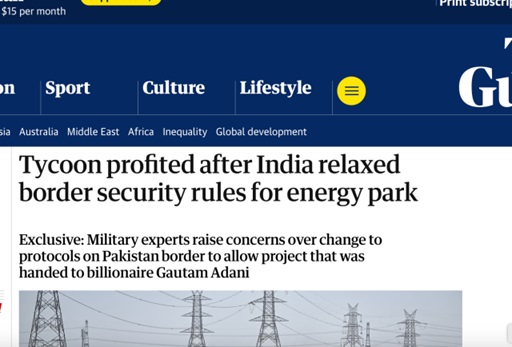
Congress MP Manickam Tagore has moved a motion for the adjournment of the Business of the House in the Lok Sabha to discuss the relaxation of national security protocols for the Khavda Renewable Energy Project in Gujarat, located near the India-Pakistan border. The move has triggered a heated political debate, with allegations of cronyism and foreign influence surfacing in the discourse.
Tagore, in his notice, raised concerns about the location of the project, stating, “The Khavda Renewable Energy Park Project, led by the Adani Group, is situated just one kilometre from the sensitive India-Pakistan border in the Rann of Kutch, a region with a history of conflicts between the two nations.”
The Congress leader further accused the Modi government of overriding military concerns to push the project forward. “The government went so far as to create exceptions for this project, and potentially others, near India’s borders with Pakistan, China, Nepal, Myanmar, and Bangladesh. This is a direct assault on the integrity of military advice and national security protocols. The Modi government’s cronyism, with its clear favouritism toward the Adani Group, is a threat to the sovereignty of our nation. The decision to award such a high-risk project to Adani raises severe concerns about conflicts of interest and transparency in governance,” he said.
While the Congress party’s allegations are not new—having long accused the BJP government of neglecting India’s military interests—the timing of this particular motion has raised eyebrows. Critics argue that the move appears to be influenced by a foreign narrative, especially given that it comes just a day after British news portal The Guardian published an article making similar claims against the project.
Foreign Influence Allegations
The Guardian’s article, titled “Tycoon profited after India relaxed border security rules for energy park,” was authored by Hannah Ellis Petersen and Ravi Nair. The report alleged that Adani Group benefitted from the relaxation of security protocols, citing a US attorney’s case against the conglomerate. However, critics of the article pointed out that the attorney’s case was politically motivated and flimsy, raising concerns about a targeted smear campaign against India’s largest energy conglomerate.

Petersen has previously been accused of anti-India and anti-Hindu activism under the guise of journalism, while Ravi Nair is linked to the Organized Crime and Corruption Reporting Project (OCCRP), a Left-leaning organization funded by George Soros and USAID, which has frequently targeted Adani and major Indian infrastructure projects.
The article, while raising concerns about security protocol amendments, failed to substantiate why such changes would pose a significant risk. Critics argue that amending regulations to facilitate infrastructure projects is a sovereign decision, especially in a barren, sparsely populated desert region like the Rann of Kutch.
Strategic Importance Of Khavda Project
The Gujarat government, in coordination with the central government and the Ministry of Defence, cleared the Khavda Renewable Energy Project, which aims to produce 30 gigawatts of clean energy. This project, once operational, is expected to power millions of homes, including supplying electricity to Google’s cloud services in India. When fully developed, the plant is projected to generate 81 billion units of clean energy annually, powering 16 million households—more than the total number of homes in Poland and Canada. Additionally, it is expected to create over 15,200 ‘green’ jobs.
Critics of Congress argue that the development of border areas is crucial for national security. Historically, India’s border regions have been left underdeveloped, making them vulnerable to security threats. Infrastructure projects like the Khavda energy park contribute to improved connectivity, economic opportunities, and a stronger military presence in these regions.
Defence analysts suggest that a high-profile energy plant supplying power to millions of households and global companies like Google would naturally be equipped with state-of-the-art security systems. “Leaving border areas barren and undeveloped is a strategic mistake,” one expert noted. “A thriving border region with roads, connectivity, and surveillance infrastructure strengthens national security, not weakens it.”
Congress And Its History Of Parliamentary Disruptions
The adjournment motion over the Khavda project has also reignited criticism of the Congress party’s tendency to disrupt parliamentary proceedings based on foreign media reports. Earlier, Prime Minister Narendra Modi had remarked that this Budget Session would be the first in years not triggered by a ‘foreign spark’—a reference to Congress’s pattern of picking issues championed by Western media outlets and creating political turmoil in Parliament.
In recent years, Congress has seized upon various foreign-origin controversies, including Pegasus, Rafale, and Hindenburg reports, to attack the Modi government. Critics argue that the party continues to ignore pressing domestic issues while engaging in political theatrics to align with narratives pushed by Western media and organizations.
As the political battle over the Khavda Renewable Energy Project unfolds, it remains to be seen whether Congress’s motion will gain traction or be dismissed as another attempt to stall parliamentary proceedings. Meanwhile, the government is expected to defend the project as a critical step toward India’s energy security and strategic border development.
(With inputs from OpIndia)
Subscribe to our channels on Telegram, WhatsApp, and Instagram and get the best stories of the day delivered to you personally.




